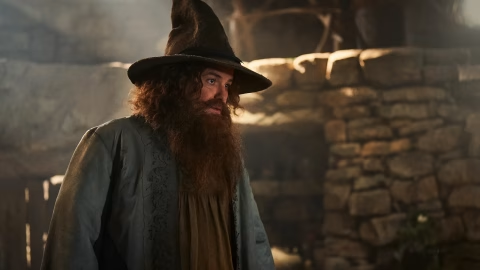Tom Bombadil, the enigmatic and whimsical character from J.R.R. Tolkien’s The Lord of the Rings, is finally stepping into the limelight. Known for his colorful attire, nonsensical songs, and ethereal presence, Bombadil is a figure who has long intrigued readers but has been conspicuously absent from major film adaptations. Both Ralph Bakshi’s 1978 animated film and Peter Jackson’s Oscar-winning trilogy omitted him entirely. However, Amazon Prime Video’s The Rings of Power is set to change that with its second season, premiering on August 29.
In Tolkien’s lore, Bombadil is described as “older than the old,” a primordial being who existed since the dawn of time. His inclusion in The Rings of Power, which delves into the ancient history of Middle-earth, aligns perfectly with the established canon. Tolkien once described Bombadil as “the spirit of the (vanishing) Oxford and Berkshire countryside,” a personification of nature itself. This characterization presents a unique challenge for the showrunners, J.D. Payne and Patrick McKay, who must integrate a character with no clear agenda or dramatic function into a narrative-driven series.
“There’s a reason why he hasn’t been in prior adaptations,” Payne explains. “He’s sort of an anti-dramatic character. He observes drama but largely doesn’t participate in it.” McKay adds, “He’s whimsical and magical, almost verging on silly, but also has the wisdom of the ages.”
Bombadil’s first appearance in The Fellowship of the Ring is memorable. He rescues the hobbits from Old Man Willow, an ancient and malevolent tree, by singing a song that soothes the tree’s anger. Later, he saves them again from the Barrow-wights, malevolent spirits in an ancient cemetery. Despite these heroic acts, Bombadil’s lack of a clear agenda makes him a challenging character to adapt for the screen.

Tolkien himself was ambiguous about Bombadil’s purpose. In a 1954 letter, he admitted that Bombadil was not essential to the narrative but represented something important to him, though he couldn’t precisely define what. Some readers speculated that Bombadil was a stand-in for God, a notion Tolkien dismissed. The character’s mystery and passivity make him all the more intriguing, a narrative riddle for the showrunners to solve.
“He has no clear dramatic function that would justify his inclusion in a really great movie adaptation,” McKay says. “But we have the advantage of a television show, and hence we are going to find a way to tap into that.”
In The Rings of Power, Bombadil will be slightly more interventionist than in the books. Payne and McKay have given him a second home on the outskirts of Rhûn, a region that has transformed from an Edenic paradise to a dead wasteland. This setting allows Bombadil to interact with the halflings Nori and Poppy and the amnesiac wizard known as the Stranger, who is on a journey to discover his purpose.
“When he finally crosses paths with the Stranger, you could say he has a desire to try to keep the destruction that has happened there from spreading to his beloved lands in the West,” Payne explains. “He nudges the Stranger along his journey, which he knows will eventually protect the larger natural world that he cares about.”
Rory Kinnear, known for his roles in Penny Dreadful and Black Mirror, will portray Tom Bombadil. Kinnear admits he was a Lord of the Rings novice before taking on the role. “I was honest—I hadn’t read it,” he says. “But my partner, who knew the books and films, was excited. She said, ‘He’s my favorite character in all of the books.’”
Kinnear’s portrayal of Bombadil draws inspiration from both the innocence of childhood and the permanence of extreme age. He worked with a dialect coach to develop a Cornish accent, aiming to capture the ancient, geological essence of the character. “I wanted him to be somewhat distinct from the other characters,” Kinnear says. “But I also wanted to choose an accent that felt old—that was British, but felt like the oldest part of Britain.”
As The Rings of Power’s second season unfolds, Bombadil will offer aid and comfort not just to the Stranger but also to the audience. “Season one set the pieces on the chessboard, and in season two the pieces are in motion and it’s really about the villains,” Payne says. “Tom Bombadil is a real point of light amidst an otherwise sea of darkness.”
In addition to his role in The Rings of Power, Bombadil will also be featured in a new edition of Tolkien’s 1962 book The Adventures of Tom Bombadil, set to be published on August 20. This edition will include poems about Bombadil, some of which date back to long before Tolkien’s epic trilogy. The enduring fascination with this enigmatic character continues to captivate readers and now, finally, viewers as well.
Tom Bombadil’s inclusion in The Rings of Power promises to bring a touch of whimsy and ancient wisdom to the series, offering a unique blend of light and depth to the unfolding narrative. Bombadil is a delightful enigma, a character who defies easy explanation, but in his own way is the heart and soul of Middle Earth. Tolkein meant him to be a force of nature, something not meant to be known by mortals, and part of the fabric of myth and legend itself.
And that’s the delight of mysteries. If you spend too much time explaining some of them, it takes the magic away.
Despite his increased role, Payne and McKay have decided not to resolve any of the mysteries surrounding Bombadil that Tolkien left unanswered. As Chris Smith, the publishing director for Tolkien’s titles, puts it: “Perhaps the only answer to the enigma that is Tom Bombadil is simply to accept that, as Tolkien wrote in The Lord of the Rings, ‘He is.’”
![]()
SCIFI.radio is listener supported sci-fi geek culture radio, and operates almost exclusively via the generous contributions of our fans via our Patreon campaign. If you like, you can also use our tip jar and send us a little something to help support the many fine creatives that make this station possible.













Tom Bombadil is one of my favorite Tolkien characters, if not one of my favorite characters period. Reading the books, I related his entrance to being similar to that of Beorn’s in *The Hobbit*. At least I did when I first read them in high school.
My class was assigned to read *The Hobbit* when I was in high school. By the time of the quiz on the book, I had gone on to also read the three volumes of *The Lord of the Rings*. Reading four books before taking a quiz on the first one did not make things easy.
And I of course drew on Tolkien for my own *GURPS Fantasy Folk: Elves.* It would be hard to write anything about elves without at least thinking of Tolkien.